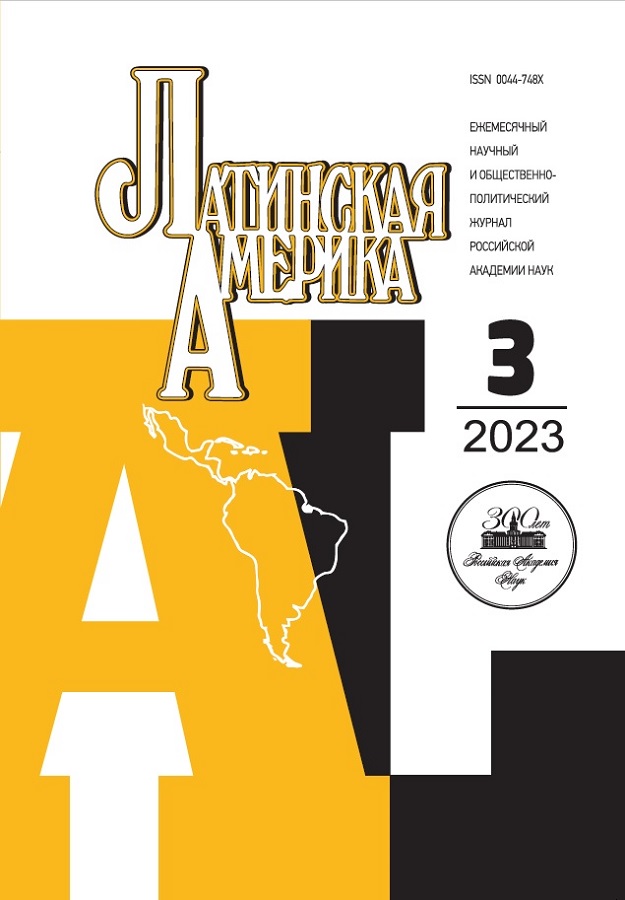№ 3 (2023)
Иберийский аспект
Экономика Испании сквозь призму теории сложных систем. Опыт концептуального моделирования
Аннотация
Кризисные потрясения последних десятилетий (прежде всего, мировой финансовый кризис 2008—2009 гг. и коронакризис 2020 г.) создали спираль сдерживания экономического роста Испании, обострили внутренние социально-политические противоречия и ослабили международные позиции Мадрида. Именно «рваный» ритм хозяйственного развития актуализировал задачи «перезагрузки» экономической политики, а также выработки новой модели роста. Формирование такой модели, отвечающей на современные геоэкономические вызовы, заняло доминирующее место в повестке нынешнего испанского правительства, ориентированного на реформирование экономики с целью ее модернизации и адаптации к стремительно меняющимся национальным, европейским и глобальным реалиям. Главная проблема состоит в том, что реформировать нужно сложную и противоречивую систему, каковой является современная испанская экономика. На практике это означает необходимость одновременно решать разноплановые проблем и учитывать большое количество факторов, взаимодействующих между собой и с окружающей средой. Задача осложняется и тем, что процесс реформ протекает в обстановке острой внутриполитической борьбы, усиливающейся в связи с намеченными на 2023 г. всеобщими выборами.
 6-20
6-20


Актуальная тема
«Цифровая сила» в странах Латинской Америки: хэштеги и дипфейки как политические инструменты
Аннотация
Страны Латинской Америки входят в первую десятку государств мира, в которых использование Интернета, социальных сетей, а также новых технологий – дипфейков или синтетических СМИ – вышло на новый уровень. «Цифровая дипломатия» как средство влияния на аудиторию посредством социальных сетей оказалась востребованным инструментом во внутренней и внешней политике многих государств, включая Уругвай, Бразилию, Венесуэлу и др. Инструменты этой «дипломатии» являются частью «цифровой силы», трактуемой как способность страны оказывать влияние на технологические и политические процессы, происходящие в мире. В данной статье рассматриваются цифровые инструменты влияния – «дипломатия хэштега» и дипфейки, которые наиболее часто применяются в странах Латинской Америки в ходе тех или иных политических событий. Если с помощью «дипломатия хэштега» осуществляется быстрая мобилизация населения, то дипфейки позволяют манипулировать аудиторией посредством создания синтетического контента, ложных новостей и событий, усиливая поляризацию мнений, распространение слухов и конспирологических теорий, а также побуждая к экстремистским действиям. Высокая эффективность и дезинформирующий потенциал технологии позволяют рассматривать немногочисленные примеры деструктивного использования интернет-ресурсов как угрозу национальной безопасности. Для иллюстрации активности государственных и негосударственных акторов в социальных сетях авторы приводят пример социальной платформы Tik-Tok. Методология исследования опирается на количественный сбор данных из социальных сетей, выявленных в режиме реального времени в латиноамериканском сегменте Интернета, и на их анализ. Результатом исследования стала классификация дипфейков, наиболее активно использующихся в политических целях. В статье анализируются примеры как деструктивного, так и «мягкого» применения дипфейков.
 21-33
21-33


Технологии искусственного интеллекта и нарастающие киберугрозы в Латинской Америке
Аннотация
Технологии искусственного интеллекта (ИИ) стали настоящим прорывом в мире виртуальной коммуникации для современного общества. Страны Латинской Америки лишь начинают внедрять этот тип технологий с целью достижения парадигмы «умного правительства» и ускорения темпов построения цифровой экономики. Ряд государств инвестируют в стратегии развития технологий ИИ, сосредотачиваясь на повышении уровня экономического развития, прилагая значительные усилия для активизации сотрудничества на региональном уровне. Экономическая комиссия для Латинской Америки и Карибского бассейна (ЭКЛАК) на протяжении нескольких лет также стремится использовать огромный потенциал ИИ, включая цифровую трансформацию госсектора. Мировая концепция кибербезопасности становится особенно актуальной в связи с растущим использованием киберпространства как виртуальной среды для политического, экономического, социального и культурного взаимодействия. На сегодняшний день кибербезопасность стала важной темой национальных стратегий латиноамериканских стран в связи с участившимися случаями вредоносного использования ИИ в политической и экономической жизни региона.
Целями данного исследования являются выявление особенностей национальных стратегий внедрения ИИ в госсектор стран Латинской Америки и определение основных кибер-инструментов, направленных на подрыв национальной безопасности и дестабилизацию политических акторов.
 34-48
34-48


Время и люди
От Охотного ряда до Ист-Ривер: жизнь и судьба революционера Хосе Антонио Майобре
Аннотация
В статье, написанной на основе ранее не публиковавшихся архивных документов, мемуаров, сопоставленных с научной литературой, рассматривается биография выдающегося венесуэльского экономиста и политического деятеля Хосе Антонио Майобре. Жизнь его была наполнена яркими событиями: участием в основании и деятельности компартии Венесуэлы, работой в таких разных международных организациях, как Коммунистический интернационал, Международный валютный фонд (МВФ), ООН, Экономическая комиссия ООН для Латинской Америки, в правительстве Венесуэлы и на дипломатической службе. Авторы сопоставляют повороты в жизни Майобре с этапами всемирной и венесуэльской истории.
 49-72
49-72


Международные связи
Внешнеполитическая линия Эквадора после президентских выборов 2021 г.
Аннотация
В статье рассматривается внешняя политика эквадорского президента Гильермо Лассо (2021 — н/в) в течение первого года его пребывания у власти. Опираясь на ряд новых источников, автор анализирует основные направления и изменения в отношениях Эквадора со значимыми региональными, внерегиональными и другими партнерами, выявляя закономерности, связывающие деятельность нынешней власти с предыдущими президентскими администрациями, а также прогнозируя, как будет выглядеть международная политика Эквадора в ближайшие годы.
 73-89
73-89


Андское сообщество — Евразийский экономический союз: есть ли перспективы?
Аннотация
В статье на основе междисциплинарного подхода рассмотрен интеграционный опыт Андского сообщества (Comunidad Andina, CAN) в контексте его отношений с Евразийским экономическим союзом (ЕАЭС). За период своего существования CAN не раз претерпевало внутренний кризис и реформирование институциональной модели, но сумело преуспеть в создании зоны свободной торговли и усилить внерегиональные связи. Инициативы сообщества и разветвленная институциональная структура во многом свидетельствуют об укреплении социально-экономического сотрудничества стран в области поддержки бизнеса, академического сообщества и коренных народов. CAN представляет интерес в контексте развития трансрегионального взаимодействия между ним и ЕАЭС. Обе структуры заинтересованы в обмене опытом и практиками в сфере интеграционного развития. По оценке автора, ключевыми задачами для CAN и ЕАЭС должны стать не только имплементация подписанных документов, но и постоянное поддержание диалога в рамках формальных институциональных механизмов, определение взаимовыгодных направлений сотрудничества.
 90-103
90-103


Размышляя о прочитанном
Истоки «левого поворота» Латинской Америки в революции XX в.
Аннотация
В рецензии анализируется опубликованная в 2021 г. коллективная научная работа, в которой прослеживается связь между левым движением Латинской Америки с начала ХХ в. и современным трендом «левого поворота», охватившим значительную часть региона.
 104-110
104-110











